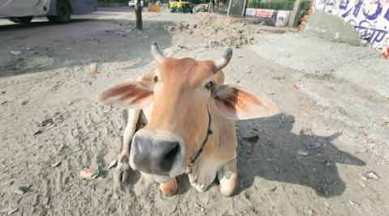Stay updated with the latest - Click here to follow us on Instagram
Punjab soap makers feel ‘unsafe’ as cow vigilantes target buffalo tallow
There are 125 soap units in Punjab, all legally using buffalo tallow in the manufacturing process.

Forcible inspection of tankers carrying buffalo tallow by cow vigilante groups in Punjab has forced at least one soap unit in the state, running for the past 31 years, to shut shop.
Surinder Goyal, the president of the All-Punjab Soap Manufacturers’ Association, says he wouldn’t be surprised if others followed suit. “Eighteen tankers (of buffalo tallow) have been seized by police under pressure of cow protection groups in the past six months from different parts of Punjab. If it continues, soon you will see more soap units closing down.”
monthly limit of free stories.
with an Express account.
Gauvardhan Anand and son Deepak Anand, the owners of Anand Soap Manufacturing Co., that used to run in Amritsar, said the business “was no more safe”.
“I only know how to make soap, I have no other business skill. But my 73-year-old father was disturbed by the routine unauthorised checking of buffalo tallow tankers by cow protection groups to check if it was cow tallow. We would often get our supply late. We would have to give money to get the tanker freed,” says Deepak.
There are 125 soap units in Punjab, all legally using buffalo tallow in the manufacturing process. Tallow is a vital ingredient in soap. They mostly manufacture laundry and not toilet soap, which sells widely in cities as well as villages, for Rs 25-35 per kg.
“We prefer buffalo tallow for many reasons. First it produces better quality soap, with more shine. Secondly, it is cheaper than vegetable oil. Buffalo tallow is being used all over India and it is not possible for Punjab units to avoid buffalo tallow if they have to remain in competition,” says Goyal.
“How could we use cow tallow when it is banned in India? No soap unit produces tallow on its own. It is a byproduct of buffalo slaughterhouses and we buy it from them legally,” he adds. “I will not name any political party, but it is true that cow protection groups have become more active in the last one and a half years.”
Goyal also alleges that many truckers have been beaten up and police are working under pressure from such vigilante groups.
Meher Chand, the owner of Amritsar-based Agni soap unit and secretary of the Punjab Soap Manufacturers’ Association, also claims pressure from such groups. “We have been writing on our soap packets that these carry buffalo tallow. Minimum Rs 30,000 VAT is being paid to the Punjab government on every tanker of tallow. If cow protection groups have any problem with tallow, they should ask the Punjab government to close the buffalo slaughterhouses. We just buy the byproduct from these slaughterhouses.”
Four buffalo slaughterhouses in Dera Bassi town of Mohali district supply tallow to the soap-making industry. Dera Bassi is on the border with Haryana. Adjacent to Dera Bassi is Rajpura in Patiala district, which is known for cow protection groups.
Vehicles exiting Dera Bassi for other parts of Punjab have to make the run through Rajpura, which is when they are most vulnerable to being stopped by such groups.
“It becomes the responsibility of the soap unit owner to prove his/her innocence in case police seize the tanker suspecting it to be cow tallow. Worse, it is almost impossible to differentiate between buffalo tallow and cow tallow,” says Goyal.
Denying that police were under pressure from cow protection groups, DIG, Patiala range, Balkar Singh Sidhu says, “I will check if any group is harassing any businessman.”
Punjab’s Regional Disease Diagnosis Laboratory (RDDL) in Jalandhar, run by the Animal Husbandry Department, is also in a tizzy. The samples for testing whether tallow is of cow or buffalo land up here, and the institute is not authorised to test tallow samples nor does it know of a method to tell the samples apart.
“We have received around 12 samples in the last 10 months. We tried to work on them and find a method. But it is not possible for us to extract DNA from tallow and we cannot find origin of tallow without DNA. We can differentiate between cow and buffalo meat because DNA can be easily extracted from meat, but the same is not possible with tallow. Recently we wrote to our director that we do not know how to test tallow for its origin. We do not even know if such a method exists,” says RDDL joint director Vinay Mohal.
RDDL has also approached the National Research Centre on Meat, Hyderabad, which had earlier trained RDDL staff to identify different types of meat.
Says Dr Harjinderjit Singh Sandha, Director, Punjab Animal Husbandry Department, “We also had a meeting with our minister Gulzar Singh Ranike. Food safety and security officials of state at the meeting maintained that while there is a method to find out if tallow is of vegetarian or non-vegetarian origin, it is not possible to tell if it came from cow or buffalo.”
The Anands, who had installed new machines at their factory a couple of years ago, don’t know if they can go back to soap-making. “The hue and cry in the name of cow protection has also increased the social stigma attached to the business. Earlier no one was bothered if tallow was being used in manufacture of soap. Now cow protection groups have been running a campaign to make people feel as if we are committing some crime.”